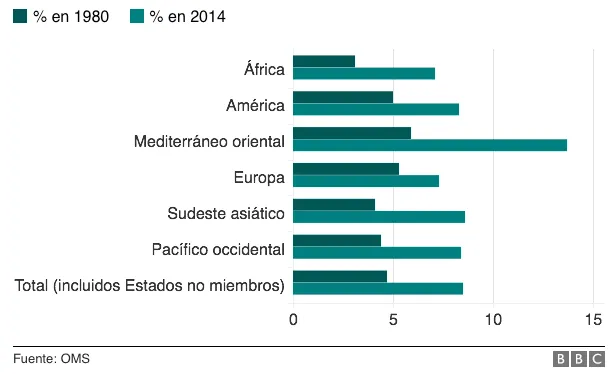This has just been announced by the World Health Organization (WHO) in its first "World Diabetes Report", in which it maintains that 1 out of 11 people in the world already suffer from the disorder.
The figures also indicate that the number of affected people was practically quadrupled in the last 30 years.
"According to estimates, 422 million adults had diabetes in 2014, compared to 108 million in 1980," says WHO.
"It is a silent disease, but its march is being relentless and we have to stop it," he told BBC Etienne Krug, responsible for WHO's efforts in the fight against the disease.
The greatest increase occurred in recent years and unequally.
Put on the test!Are you at risk of being diabetic?
According to scientists, "in the last decade, the prevalence of diabetes increased faster in low and medium income countries than in high income."
And the numbers will continue to increase as long as "drastic actions" are not adopted.
more obese, more diabetic
Diabetic person injecting insulinathinkstock
The increase in type 2 diabetes is directly linked to overweight and an unhealthy lifestyle.
The highest health authority speaks in its analysis of both types of diabetes (1 and 2), although the greatest increase occurred in type 2 diabetes, linked to an unhealthy lifestyle.
As the waists earn centimeters, diabetes cases also increase.
Indeed, scientists are worried about obesity in the world that, as noted by the scientists of Imperial College in London just a few days ago, "will have great consequences for health."
What are the most obese countries in the world?
How diabetes has taken its toll
422 million adults lived with diabetes in 2014;314 million people in 19808.5% of adults in the world have diabetes
1.5 million people died as a result of diabetes in 2012
2.2 million more deaths took place due to excessive levels of sugar
43% of these 3.7 million people died before he turned 70
Source: WHO
But Krug is something more optimistic: "We can stop diabetes. We know what needs to be done."
"But we cannot let it evolve in this way because it has a huge impact on people's health, families and society," he adds.
One of the measures is to reduce the high consumption of sugar.
In fact, blood sugar levels triple the risk of suffering a heart attack and multiply by 20 the possibilities of suffering a leg amputation.
They also increase the risks of stroke, blindness and complications during pregnancy.
Reducing blood sugar levels is an essential measure.thinkSotck
Reducing blood sugar levels is an essential measure.
The matter is serious: diabetes is the eighth cause of death in the world and is guilty of 1.5 million deaths every year.
But another 2.2, millions of deaths are linked to high blood sugar levels.
Joint action
As for the possible solutions, the WHO considers that "there are no interventions or policies that alone can ensure that it stops the advance of diabetes) occurs."
"In most poor countries, people with diabetes do not have access to medicines and technologies they need."Etienne Krug, WHO
And it is necessary, according to the agency, a joint action by the whole society.
Why the simple gesture of separating salt from sugar can be key in the fight against type 2 diabetes
"The" easy 'solution for all of us is to makeExercise, eat healthy and not gain too much weight.And, of course, it's not so easy, "says Krug.
Glucose monitors are fundamental to diabetic people, but not everyone has access.
According to the expert, it is necessary for governments to act to regulate the amounts of fat and sugar in food and ensure that there are healthy options available for people.
It is also essential, he adds, better urban planning that motivates citizens to bike or walk.
In addition, the food industry must act responsible for reducing the content of fat and sugar in food and stop promoting unhealthy food, says Krug.
How much does the amount of fat we consume matter?
The only way to contain the progress of the disease is to maintain blood sugar levels under control.
But, according to the report, two thirds of low -income countries do not have glucose monitoring systems, or cannot provide medications such as insulin or metformin to most of its inhabitants.
"There are two things in this report that really worry me: one is that one in 11 people in the world has diabetes. The other, the lack of equity," says Krug.
"In most poor countries, people with diabetes do not have access to medicines and technologies they need."


